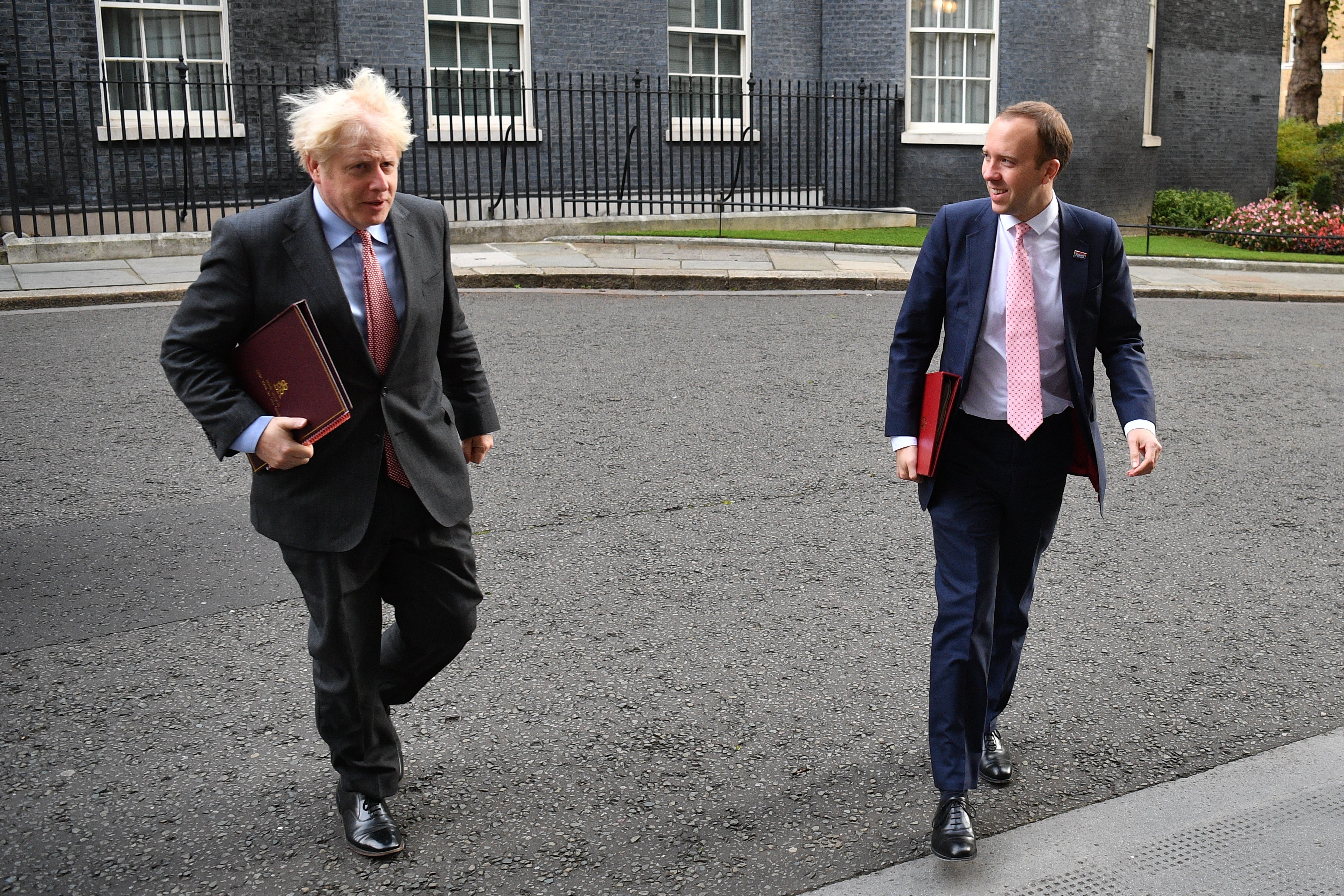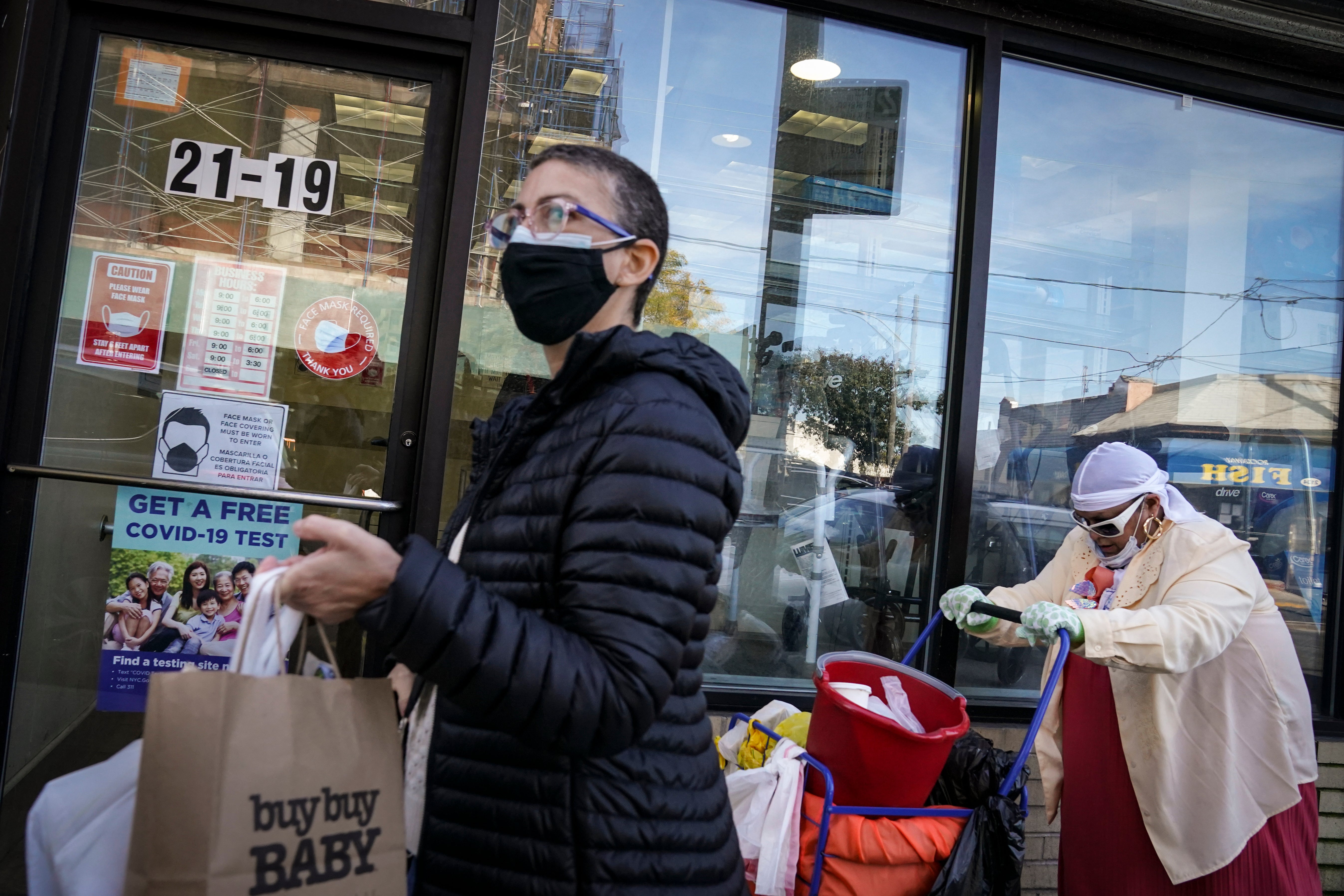Coronavirus news: Manchester Tier 3 talks end without deal, as Wales imposes ‘firebreak’ restrictions
Follow for the latest developments
Your support helps us to tell the story
From reproductive rights to climate change to Big Tech, The Independent is on the ground when the story is developing. Whether it's investigating the financials of Elon Musk's pro-Trump PAC or producing our latest documentary, 'The A Word', which shines a light on the American women fighting for reproductive rights, we know how important it is to parse out the facts from the messaging.
At such a critical moment in US history, we need reporters on the ground. Your donation allows us to keep sending journalists to speak to both sides of the story.
The Independent is trusted by Americans across the entire political spectrum. And unlike many other quality news outlets, we choose not to lock Americans out of our reporting and analysis with paywalls. We believe quality journalism should be available to everyone, paid for by those who can afford it.
Your support makes all the difference.The government moved closer to imposing Tier 3 coronavirus restrictions on Greater Manchester after the latest round of talks collapsed without a deal.
Local leaders, including mayor Andy Burnham, had initially expressed hope an agreement could be reached on extra funding for the region on Monday, only for ministers to reject the proposals.
And on Monday night communities secretary Robert Jenrick issued a letter setting a deadline of 12pm on Tuesday to settle the dispute.
The government also held talks with several other regions in northern England, including the North East and South Yorkshire, over a move into Tier 3.
Meanwhile Wales announced a two-week “firebreak” lockdown will be imposed from 6pm on Friday to prevent the NHS from being overwhelmed.
First Minister Mark Drakeford said the “sharp and deep” new restrictions would last for 17 days and would require everyone except key workers to stay at home.
Ireland also confirmed it would begin a second national lockdown from midnight on Wednesday. The Level 5 restrictions will see schools stay open but non-essential businesses close. People will be told to stay at home for six weeks unless taking exercise within a 5km radius.
Irish premier Micheal Martin said the measures were necessary to curb the rise in cases and hospital admissions, adding: "As Taoiseach I am asking everyone again to take this threat seriously."
14 new plasma donation centres opened across UK
Matt Hancock has announced the opening of 14 new plasma donation centres across the country where people who have had Covid-19 can donate their blood.
NHS Blood and Transport (NHSBT) is opening the new centres across England throughout November and December.
Blood plasma from people who tested positive for coronavirus can be used in treatment trials for the virus, and the NHS hopes the trial results could be delivered before the end of the year.
The new centres will open in locations including Bolton, Stockton-on-Tees and Wolverhampton. They will form part of the world’s largest randomised plasma trial for treatment of Covid-19.
What are Boris Johnson’s options to regain control of Covid-19?
Our chief political commentator John Rentoul outlines the tough decisions the prime minister has to make as Covid-19 continues to rampage throughout the country.

What are Boris Johnson’s options to try to regain control of the virus?
The PM has tough decisions to make as the virus continues to surge, writes John Rentoul
New strategies deployed by Europe and the US to tackle rising coronavirus cases
As the internal scuffles over lockdown restrictions continue in the UK, countries in Europe and the Americas are also trying more targeted measures to stamp out a surge in Covid-19 infections and avoid national lockdowns that saw economies come to a shuddering halt.
Learn more about what the rest of the western world is doing to halt the spread of coronavirus:

Europe and US attempt new strategy to decrease coronavirus cases
After shutdowns swept entire nations during the first surge of the coronavirus earlier this year, some countries and U.S. states are trying more targeted measures as cases rise again around the world
Meanwhile, in China…
China is leading in the global recovery from the coronavirus pandemic, as it recorded economic growth of 4.9 per cent in the third quarter of 2020.
After the first cases of Covid-19 were discovered in the city of Wuhan and quickly spread throughout the country and the world, China imposed a strict lockdown, closing down factories and banning travel into and within the country in an effort to stop the disease from spreading further.
Lockdown measures were eased in April after a drop in reported cases and the Chinese government put a hefty stimulus package in place to boost the economy, reports Namita Singh.

China records big jump in economic growth as it leads global Covid-19 recovery
China’s economy saw growth of 4.9% between July and September as retail spending returned to pre-virus levels for the first time
Coronavirus cases hits 40m worldwide
There have now been 40 million coronavirus cases recorded globally, just a month after the number passed 30 million.
The number of new infections around the world averages more than 350,000 per day, up from around 200,000 new daily cases in July, reports Anthony Cuthbertson.
World Health Organisation director general Dr Tedros Adhanom Ghebreysus warned that the numbers will continue to rise with the arrival of flu season in the northern hemisphere.

Coronavirus cases hit 40m worldwide as infections accelerate
More than 1m Covid-19 cases registered every three days around the world
UK sees one of fastest increases in infection numbers in Europe
As the number of coronavirus infections hits 40 million worldwide, The Independent can reveal the best- and worst-performing major nations in Europe in terms of infection rates.
Our Travel Correspondent Simon Calder reports that, according to data processed by The PC Agency, the UK, Italy and the Netherlands have performed far worse than any other major country apart from the Czech Republic.
On the other hand, Greece has managed the virus extremely well in comparison. Read the full report here:

European coronavirus infection rates compared
Exclusive: Czech Republic, Italy and the Netherlands have seen surges in cases, while Greece has stayed low
Scotland must be prepared to close schools again, warns teaching union
A teaching union has warned that the Scottish Government must be prepared to close schools if required to curb the spread of coronavirus.
First Minister Nicola Sturgeon has said repeatedly that she wants to avoid closing schools again, but teaching union EIS said clarity must be given to schools on the conditions of their closure if it were to happen again.
Scotland is expected to publish a strategic framework this week that will include a tiered alert system, much like the one put in place in England last week.
General secretary Larry Flanagan said: “Everyone understand the importance of schools being open but as is now evident from decisions and discussion elsewhere if they need to close, even temporarily, in order to control the virus, that is a decision we need to be prepared to make.
“As a country we should be open and transparent as to the type of indicators which would trigger such a move so that pupils, parents and teachers can be as prepared as possible for such an occurrence - a few days’ notice, for example, would be woefully insufficient.”
Most excess deaths in private homes not related to Covid-19
The Office for National Statistics (ONS) has confirmed that excess deaths in private homes - the number of deaths above the average for the corresponding period in the previous five years - have mostly been deaths not involving Covid-19.
Out of 25,472 excess deaths in private homes in England up to 11 September, just non per cent (2,358) were deaths involving the novel coronavirus.
In Wales, of 1,642 excess deaths in private homes over the same period, only eight per cent (134) deaths involved Covid-19.
Deaths in private homes in England for males from heart disease since the pandemic hit (from 14 March to 11 September) are 26 per cent higher than the five-year average, the ONS revealed today. In Wales, deaths from heart disease for males are up 23 per cent.
Deaths from prostate cancer have risen by 53 per cent while deaths from bowel cancer are up 46 per cent in England. This increases to 75 per cent for prostate cancer deaths and 52 per cent for bowel cancer deaths in Wales.
For women, deaths from dementia and Alzheimer’s disease have increased by 75 per cent while deaths from breast cancer are up 47 per cent. This also increases in Wales, with female deaths from dementia and Alzheimer’s disease almost double the five-year average (up to 92 per cent). Deaths from breast cancer are lower in Wales, up 28 per cent.
‘Unclear how many of these lives could have been extended had they gone to hospital’
New data from the ONS suggests that most excess deaths that occurred in private homes since the pandemic began would normally have occurred in hospital, statistician and chair of the Winton Centre for Risk and Evidence Communication, Professor Sir David Spiegelhalter, has said.
Reacting to the new figures on excess deaths in private homes today, Mr Spiegelhalter said it was “unclear” how many people whose lives could have been “extended” if they had gone to the hospital for treatment.
He said: “Over 25,000 extra home deaths have occurred this year, particularly from ischaemic heart disease, diabetes, dementia, and Alzheimer’s.
“Usually around 300 people die each day in their homes in England and Wales - the latest ONS analysis confirms that even after the peak of the epidemic, this has stayed at around 400 a day and shows no sign of declining - that’s one-third extra, very few of which are from Covid.
“Non-Covid deaths in hospital have correspondingly declined, suggesting most of these deaths would normally have occurred in hospital, and people have either been reluctant to go, discouraged from attending, or the services have been disrupted.
“It is unclear how many of these lives could have been extended had they gone to hospital, for example among the 450 extra deaths from cardiac arrhythmias.
“Crucially, the ONS data cannot tell us about the quality of these deaths, particularly in terms of the end-of-life care provided to the patients and the support for their families.”
Labour MP admitted to hospital after testing positive for Covid-19
Yasmin Qureshi, MP for Bolton South East, has gone into hospital to be treated for pneumonia after testing positive for coronavirus two weeks ago.
She made the announcement on her Facebook page, giving praise to hospital staff and thanking everyone working there “in such difficult circumstances”.
Our Political Editor Andrew Woodcock reports:

Labour MP in hospital with pneumonia after contracting Covid
The latest breaking news, comment and features from The Independent.

Join our commenting forum
Join thought-provoking conversations, follow other Independent readers and see their replies
Comments